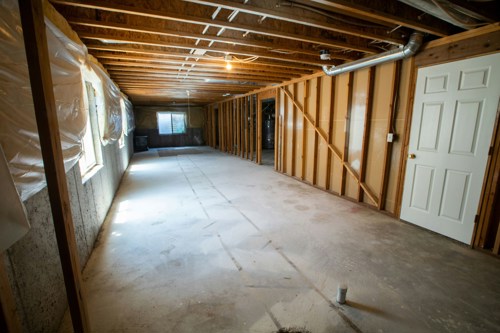
Turning your cellar into a usable space is a smart way to get more room in your home. It can make your house more functional, giving you extra space to relax in, and it adds value to your property.
In this blog, we’ll look at the average cost of a cellar conversion, common uses, the benefits and what to consider before you take the plunge.
How much does it cost to convert a cellar?
When considering home renovations, if extending upwards or outwards is not feasible, converting a cellar can be a useful solution. However, cellar conversions can cost a fair amount of money, so it is vital you consider whether it is worthwhile and affordable for you.
The cost will depend on the type of construction that is required, ranging from £1,000 to £2,000 per square meter. However, if you need to excavate a new cellar and underpin it (reinforce the existing walls and foundations), it could cost you more than this.
On top of this, you need to think about other costs to make sure your living space works well. Waterproofing is very important. Therefore, putting money into a good system is necessary to stop water damage and keep the space liveable.
Good insulation and heating are also needed for a comfortable space. This might mean buying new heating systems or fixing the ones you have. Ventilation, like adding windows or fans, also adds to the total cost.
Plus, you will have to think about how you are going to furnish the space. Depending on the use of the converted cellar, you may need to consider furniture and appliances. There are cost-effective options, such as buying second-hand or using flat-pack furniture.
Common cellar conversions
There are many ways that you can use a converted cellar space. Some of the most common uses include:
- Adding another bedroom: You may consider utilising the space below the property to build another bedroom. Once renovated, this can make the perfect space for a teenager looking for more space and privacy. Alternatively, it could also be used as a handy guest bedroom.
- Support spaces: A cellar may have been traditionally used to store wine, but why stop there? Extra storage for food and drinks can be added by converting your cellar into a pantry. You could also consider using the space as a utility room, by adding a washing machine and sink.
- Home cinema: A home cinema is ideal for a dark, windowless space, creating a perfect setting for movie nights enjoyed by family and friends. This exclusive and unique addition not only enhances your living space, but can also add value to your home.
- Games room: Like a home cinema, a games room may be greatly appreciated by your loved ones, providing a versatile space that can be enjoyed by both adults and kids alike.
- Home gym – If you’re passionate about fitness and are seeking a dedicated workout space, you can transform this area into a personal at-home gym. Its seclusion from the rest of the house makes it an ideal spot for exercise routines.
There are many more potential uses for a cellar space, and your specific needs and preferences for your home will naturally guide your decision on its purpose.
What are the benefits of converting your cellar?
While the conversion of a cellar may involve a substantial expense, there are benefits that may outweigh the cost.
The main advantage is the added space to your property. Whether your family is growing, or you’d like more room for entertaining, transforming the cellar provides a practical solution to meet your expanding needs.
Also, the conversion could add value to your home. Some cellars may add an extra 30% to the value of your property. If you are planning on selling your home in the future, extra living space will be a big pull for potential buyers.
Cellar conversions can be particularly handy if you don’t have the space for a traditional extension. Many terraced houses in the UK might not have the space to expand out, but they may have unused cellar spaces.
Things to consider before converting your cellar
Firstly, as with any home renovation, you'll need to determine how you will finance a cellar conversion. Given their high costs, you might not have enough savings to cover the entire expense. Home improvement loans are available to help you with funding this purpose.
Various home improvement loans exist, so you may need to explore the different types available to find the right solution for your needs.
Also, depending on the work being completed, you may need to apply for planning permission. Often, if the cellar already exists, you won’t need to get permission to convert the space. However, if the conversion is set to change the external look of the home, such as incorporating a light well, obtaining planning permission would be necessary.
To make sure the work is done to a high standard, you may need to research contractors. Ensure you choose a reputable person/organisation by looking at online reviews and asking around.
Summary
Turning your cellar into a new space can greatly upgrade your home. It not only adds value but it can also make it more enjoyable for you and your family.
There are many ways you can use your converted cellar space, from home cinemas to utility rooms. It can be a great option if you don’t have the space to extend your property up or out.
Remember to consider how you’ll fund the conversion before starting it and find out if you’ll need to apply for planning permission before completing the work.
Think carefully before securing other debts against your home. Your home may be repossessed if you do not keep up repayments on a mortgage or any other debt secured on it.




